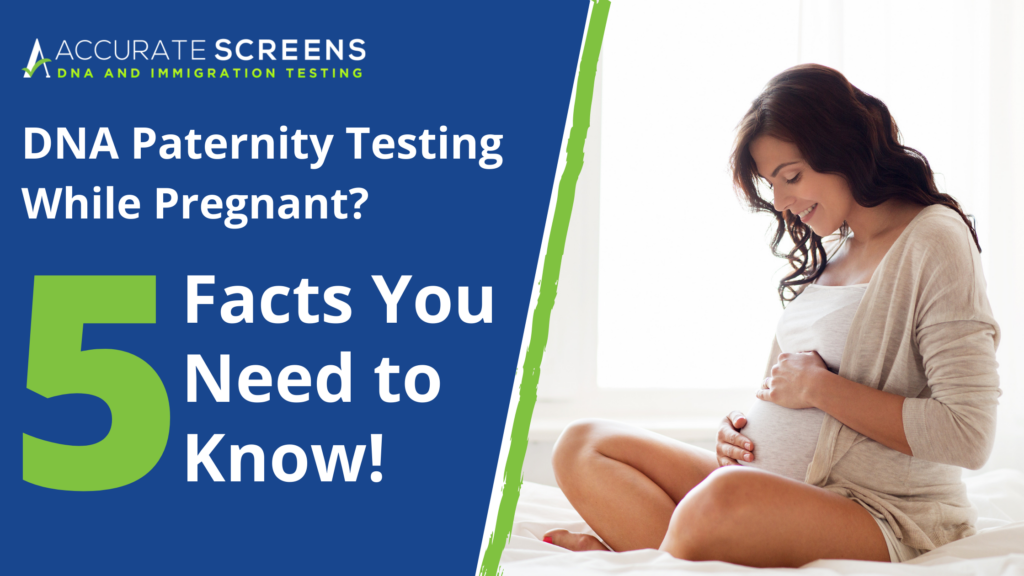Table of Contents
DNA paternity testing while pregnant can be done as early as the 7th week of pregnancy. With technological advancement, the non-invasive prenatal test is harmless with little/no risk to the mother or baby. In Oakland and San Francisco, several clinics offer these tests with high accuracy and safety.
If you wish to discover the paternity result for your would-be child, below are some facts you should know before taking the test.
1. How important is it to conduct a DNA paternity test while pregnant?
A prenatal paternity test is taken to discover the biological relationship between the alleged father and baby. The test is imperative to meet the legal, psychological, and medical requirements.
The American Pregnancy Association (APA) says that paternity test:
- Determines both social and legal benefits, including social security, inheritance, etc.
- Provides your baby’s medical history
- Strengthens the relationship between the child and father
Most states, including California, have laws that require paternity to be established on the proper forms at the hospital right after the baby’s birth, which underscores the importance of these tests.
2. Prenatal Paternity Testing: Is It Safe?
Yes, it is safe and ensures accurate results during the pregnancy, before the baby’s delivery date. Sometimes waiting for the baby’s birth before establishing paternity while also expecting infallible test results can be difficult for both parents.
So, here are some assured DNA paternity tests you can conduct during pregnancy:
Non-Invasive Prenatal Paternity (NIPP)
This is one of the most accurate tests to establish paternity while pregnant. The test involves collecting blood samples from the mother and a check swab from the alleged father for a fetal cell DNA test. A genetic profile from the cheek swab of the potential father is compared to the fetal cell sample taken from the mother’s blood sample. The result derived from this test is close to 100% accuracy. You can perform the test as early as the 7th week of pregnancy.
Chorionic Villus Sampling (CVS) or Amniocentesis Invasive Paternity Test
This test is conducted within the 10th to 20th week of pregnancy. It involves inserting a long and thin needle through the mother’s cervix or into the mother’s abdomen to collect chorionic villi samples or amniotic fluid samples from the placenta or uterus. The collected DNA is then compared to the alleged father’s DNA. Similar to non-invasive prenatal tests, the invasive prenatal test guarantees 99% accuracy in determining paternity. However, the invasive paternity test has a risk of miscarriage resulting from water breaking, premature labor pain, or infection.
Here are the possible side effects of the procedures:
- cramping
- leakage of amniotic fluid
- vaginal bleeding
- irritation/pain around the site of injection
Invasive paternity tests require a doctor’s consent, as they carry risks, and should only be performed if the noninvasive test is not an option. Accurate Screens does not prefer to perform Invasive Paternity Tests.
3. Is it possible to determine the exact date of conception accurately?
Unless it is an IVF (In Vitro Fertilization) pregnancy, where the date of the father’s sperm transfer is known, it is impossible to calculate the conception date accurately. If a woman has a regular menstrual cycle of 28 days, ovulation will occur 14 days before her next menstruation due date. However, this only gives an estimated date that may differ by 5-7 days in early pregnancy. For those in Oakland or San Francisco seeking the conception date for paternity reasons, a prenatal DNA paternity test is the best way to be sure of the father of your unborn child.
4. When can you perform the test?
Performing a prenatal DNA paternity test requires careful timing to ensure accuracy and safety for both the mother and the unborn child. Here’s a more detailed look at when and how you can perform the test:
Timing for Non-Invasive Prenatal Paternity (NIPP) Test
The non-invasive prenatal paternity (NIPP) test can be performed as early as the 7th week of the gestation period. By this time, enough fetal cells are circulating in the mother’s bloodstream to allow for accurate testing. This test involves the following steps:
- Blood Sample from the Mother: A small blood sample is taken from the mother to isolate fetal DNA.
- Cheek Swab from the Alleged Father: A cheek swab is collected from the alleged father to obtain his genetic profile.
- Comparison: The fetal DNA is compared to the alleged father’s DNA profile to determine paternity with close to 100% accuracy.
Local Considerations in Oakland and San Francisco
Several clinics in Oakland and San Francisco specialize in prenatal DNA paternity testing. It’s important to consult with local healthcare providers to understand the best timing and options for your specific situation. Here are a few tips to consider:
- Consult Personalized Healthcare Providers: Contact local obstetricians or genetic counselors who can provide personalized advice based on your medical history and pregnancy progress.
- Check Local Regulations: Familiarize yourself with any local regulations or guidelines regarding prenatal testing. California has specific laws that may impact your decision.
- Choose a Reputable Testing Facility: Choose a clinic or testing facility with a strong reputation for accuracy and safety. Local reviews and recommendations can help you make your choice.
The optimal time to perform a prenatal DNA paternity test depends on the type of test and your specific circumstances. Non-invasive tests are safe and can be done as early as the 9th week, while invasive tests are reserved for the 10th to 20th weeks of pregnancy and carry some risks. Always consult with Oakland and San Francisco healthcare professionals to ensure the best care and accurate results.
5. How much will the prenatal DNA paternity test cost?
The cost will depend upon the type of prenatal paternity test you choose to perform. The prices generally vary between several hundred to several thousand dollars. Local providers like Accurate C&S Services, Inc. (Accurate Screens) offer infallible DNA Paternity Testing services for personal and legal reasons.
Contact Accurate Screens for more information or to schedule a consultation in our Oakland and San Francisco offices. Ensuring peace of mind for your family is just a phone call away.


